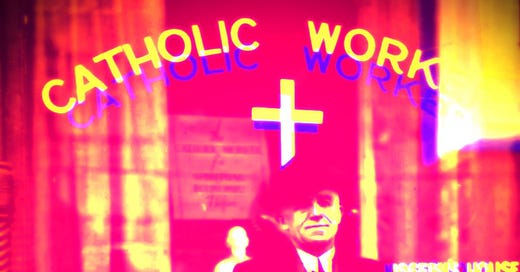[Continued from Chapter Two, Part 2.]
Peter Maurin — Communitarian and Personalist
Day’s thinking was in keeping with that of her mentor Peter Maurin, who helped her get a “truly Catholic education” through informal instruction.1 Maurin “saw in Day a gifted journalist who could publicize his ideas,”2 and this is precisely what she did. Day helped give voice to, and widely disseminate, the Roman Catholic social theory she had been taught by Maurin, in addition to his Roman Catholic Communitarian and Personalist philosophical views.
David E. Walker summarizes these philosophical positions as follows —
Catholic Personalism is the belief that the person is a good to which the only appropriate and adequate attitude is love. Personalism opposes the exploitation of the person as a means to an end. The maxim of Catholic personalism is this: Persons are not to be used, but to be loved and respected. Communitarianism is an ideology which emphasizes the connection between the individual and the community. Communitarianism emphasizes the role that the community plays in defining and shaping individuals.3
Personalism stands in opposition to “the impersonalistic development of individualistic, parliamentary democracy and the mass culture that had come to shape the countries of Western Europe.”4 In a similar vein, communitarianism
…rejects the…notion of ‘the individual’ as a rational, free and autonomous being who is an ‘end in herself’… and whose ‘inalienable’ rights, guaranteed by their ‘deontological’ nature, have the fundamental priority, or at least a fundamental priority, over the good.5
These philosophical views are not much different than those to which Day held as a Marxist prior to her conversion to Catholicism.
The primary differences, which we have already touched upon in the last chapter, have to do with theology and its consequent doctrine of anthropology. These differences notwithstanding, however, broadly speaking there is not much of a difference between the personalism of Maurin and the humanist ethos of the communists,6 nor, in some respects, the thinking which would later be articulated by French Roman Catholic Personalism’s most famous descendant — Postmodernism.
[Continued in Chapter Three.]
Forest, Jim. “Biography of Peter Maurin”, Catholic Worker, https://www.catholicworker.org/petermaurin/pm-biography.html.
Tait, Edwin Woodruff. “Houses of Hospitality”, in Christian History Magazine, Issue 104 (2013), 21.
“The Catholic Worker Movement”, Mary House Catholic Worker of Austin, http://www.catholicworkeraustin.org/cw_movement.html.
Williams, Thomas D. “Personalism”, Stanford Encyclopedia of Philosophy, Nov 12, 2009, https://plato.stanford.edu/entries/personalism/#EurPer. (emphasis added)
Myles, Nancy O. “‘The Individual’ in the Individualism/Communitarianism Debate: In Defense of Personism”, in Legon Journal of the Humanities 29.2 (2018), 244.
For an elaboration of this humanist ethos, see Márkus, György. “Marxist Humanism”, in Science & Society, Vol. 30, No. 3 (Summer, 1966), 275-287.





